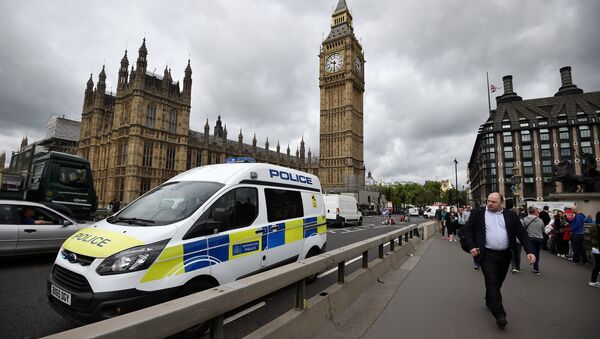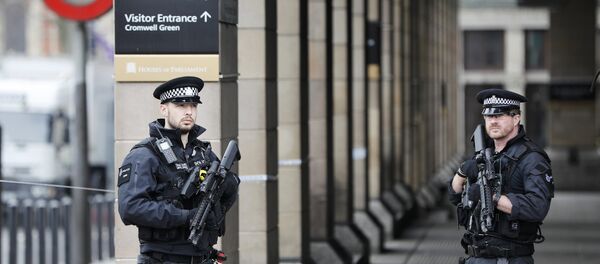Many Chinese netizens expressed their condolences as well as wondering about the security situation in their own country.
China has also suffered from its share of terrorist attacks in recent years. There have been both bomb and knife attacks in past years which have cost many lives. Some argue China should introduce even tighter counterterrorism measures, while others say China is already on the right track.
Tighter Measures Needed?
After the London attacks, there immediately followed a discussion on whether there should be changes to China's counterterrorism measures, and whether the country can learn from what has happened in Britain.
Zhou Fangzhou, a freelancer who contributes to WeChat public account "Chinese and American Scholars' Think Tank," argued that there are four types of strategies countries use to deal with terrorism nowadays.
He called the European policy "appeasement," and described Trump's policy as simply preventing Muslims from entering the country by signing a government decree in January. He argued that Israel and India have taken better approaches.
Israel has taken a highly proactive approach to security, he claimed, establishing a security intelligence net and raising the public's awareness about counterterrorism.
India's Prime Minister Narendra Modi has been accused of fighting violence with violence. In 2002 in the state of Gujarat, of which Modi was then leader, a train carrying Hindu pilgrims who had attended a ceremony at a controversial former Muslim religious site was stopped, attacked by a mob and caught flame in murky circumstances, killing dozens.
There followed several days of inter-communal violence in which some estimate around 800 ordinary Muslims and about 250 Hindus were killed. Some observers have blamed Modi for actively stoking tensions after the train incident and then failing to take action to prevent further deaths after the outbreak of violence.
The 2002 violence led to a de facto travel ban imposed on Modi by major Western countries including the US and the UK as some held him responsible for "a serious violation of religious freedom," according to The Guardian.
As terrorist attacks are regularly occurring around the world, particularly in Europe, more and more Chinese netizens are arguing the European approach to terrorism is ineffective or even weak.
The recent attacks have done nothing to curb the spread of "Islamophobia" on the Chinese Internet. Growing concern about terrorism have deepened these sentiments. There is a noticeable uptick in hateful language toward Islam and Muslims in general after such attacks and it's quite apparent that many are fearful for their own security situation and they call for tighter control.
"We need to say 'kill' to extreme Islamists! Otherwise Europe, which suffers frequent terrorist attacks today, might be what Xinjiang is tomorrow," the freelancer wrote.
Cooperation is Key
Li Wei, an anti-terror expert at the China Institute of Contemporary International Relations, told the Global Times he believes the measures taken by the Chinese government in recent years have been quite effective.
"At first some did not understand why the government took these measures, such as security checks and introducing a real name system on high speed rail," he said.
China has been cooperating with neighboring countries, preventing some potential terrorists from sneaking abroad to join extremist organizations and stopping others from sneaking back into China to conduct terrorist acts.
Li noticed that there have been online discussions about whether China should take harsher measures, and said he doesn't think these arguments are reasonable. He said fighting fire with fire can only be taken under extreme circumstances, and that counterterrorism is a long-term process.
What's more important might be international cooperation. In a 2015 interview with Oriental Outlook magazine after a terror attack in Paris, Qiao Liang, a major general in the air force and a professor with PLA National Defense University, said he had predicted that anti-terrorism war will become a key form of war in the 21 century and his prediction has unfortunately come true.
He said terrorist attacks are seldom planned and carried out wholly within one country, they are usually cross-border affairs. He said the Paris attack in November 2015, for example, was planned in Syria, prepared in Belgium and carried out in Paris. Therefore, counterterrorist measures need to go beyond borders and restrictions.
After the Paris incident, China also held a counterterrorism attack meeting to discuss possible threats and precaution.
Qiao told the Oriental Outlook that the Chinese government has been working on closing the gap between rich and poor ever since the 18th Communist Party of China National Congress in 2012, which has been important in providing stability within the country, and may even have worked better than direct counterterrorism activities.
"However, terrorist groups still threaten China's national security … so we not only need to take measures against terrorism within China, but also need to cut the routes terrorism is spreading internationally," Qiao told Oriental Outlook.
Reaction to the Attacks
Students from China are by far the biggest single overseas group at the UK's universities. The recent series of terror attacks have made many of them worry about their safety.
A Chinese student studying at University College London surnamed Hao told the Global Times that security at her college has been tighter than before and she now needs to show her student ID card when entering campus, and she saw many policemen patrolling on the streets of central London.
The university's main campus is just a few kilometers away from the site of the most recent attack, in which a van plowed into pedestrians on London Bridge before Islamist extremist knifemen attacked passersby in the nearby Borough Market area. Seven people were killed and 48 were injured in the attacks, and three attackers were also killed by police.
She still has faith in the British government's ability to keep her safe after the recent attacks, but she hopes the security measures will be further tightened, as she expects instability to continue for some time yet.
"I think many people around me have concerns about safety, some expressed they don't want to participate in larger events," she said. "Also, I don't think I will hang out around the River Thames anymore in the near future."
Another Chinese student in London, surnamed Zhu, told the Global Times that she feels let down by the British government and police and no longer trusts that they are able to ensure she stays safe. She hopes the government will increase its spending on security.
"Compared with Europe, China is so much safer," she said. "China's counterterrorism measures are rather tight … Europe's terror attacks are caused by too much freedom and too little security checks, in comparison, China has done a great job."
In fact, this is what most Chinese netizens have been talking about on forums and under news articles on social media. As soon as the news of the London Bridge attack broke, besides expressing concerns and sympathy for people affected, most frequently the netizens reflected on the domestic situation with relief.
"I can safely work outside late at night," read one comment.
"I live in Guangzhou, and I know that many attacks were already stopped long before they happened, so when you find security checks all over the city annoying and complicated, don't get angry, cooperate, it's there to protect you," another read.
However, safety measures, no matter how extensive, cannot ensure total security. In March 2014, a group of knife-wielding attackers slashed at crowds at a railway station in Kunming, capital of Southwest China's Yunnan Province, killing 29 people and injuring 143.
Two months later, a car loaded with homemade bombs ran into the crowd at a morning market in Urumqi, Xinjiang Uyghur Autonomous Region, killing 39 and injuring 94, most of whom were elderly locals who were exercising or buying vegetables early in the morning.
Security measures have been upgraded in China in recent years, with more security checks added, armed policemen stationed in high-risk areas and more personnel are being recruited every year.
This article, written by Zhang Yiqian, was originally published in the Global Times.



